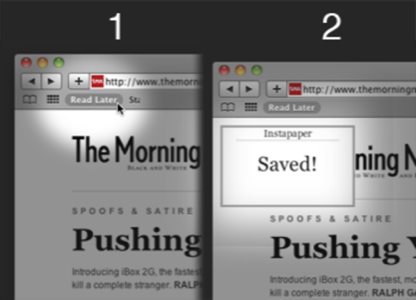One of the more subtle trends of 2010 has been the way that our reading habits have changed, due to a convergence of other Web trends: mobile apps, real-time Web (mostly Twitter), and social networking as a way to track news (mostly Facebook). In the previous era of the Web, the so-called Web 2.0, RSS Readers and start pages were all the rage. Over 2010, though, more people used tools like Twitter, Facebook, Instapaper, Flipboard, LazyWeb, Feedly and TweetDeck, to track news.

Nowadays I’m more likely to find stories to read via a vertical aggregator (the media-focused Mediagazer is my current favorite) and save them to Instapaper for later reading via my iPhone or iPad. I still use Google Reader, but in all honesty I now use it more to scan than to read.
Facebook & Twitter
Facebook has continued to expand beyond its original social networking purpose over 2010, including enabling people to track news and information of interest to them. In September, Facebook added a news search, by surfacing widely “liked” news stories from independent media organizations in its basic search bar.

Meanwhile, Twitter has become the place to go to see breaking news and the very latest updates about a popular story. If for example you want to know up-to-the-minute news on Wikileaks, then Twitter is where you’ll find it. Related, powerful aggregation apps like TweetDeck and HootSuite have become the tools of choice for power users of Twitter, Facebook and other social information services.
Mobile: Flipboard & Instapaper
Mobile apps have changed news consumption in a big way. Two apps that showcased this in 2010 were Flipboard and Instapaper.
Instapaper is an app that saves web pages for reading later. But unlike older ‘web 2.0’ social bookmarking services, it doesn’t just bookmark a web page. Instapaper saves a copy of the content so it can be read later, offline if need be, within the app. I use Instapaper frequently and one benefit has been that I’m able to read content in a more relaxed state – on my iPad in the evenings while spread out on my sofa, or in a cafe on my iPhone.

Flipboard is a magazine-like reading application built specifically for the iPad. My Co-editor at ReadWriteWeb, Marshall Kirkpatrick, is a big fan. He creates content lists on tlists.com and then subscribes to them in Flipboard (Marshall will elaborate on his methods in an upcoming post).
The main point here is that Web reading has moved away from the PC and onto mobile devices, which is changing the way we find, consume and organize our reading. Apps like Instapaper and Flipboard also place a big emphasis on sharing things. For example, I have gotten into the habit of tweeting links to articles that I enjoyed reading in Instapaper.

Whither RSS Readers?
ReadWriteWeb’s 2010 In Review:
- Top 10 Semantic Web Products of 2010
- Top 10 RSS and Syndication Technologies of 2010
- Best BigCo of 2010: Facebook
- Top Trends of 2010: App Stores
- Most Promising Company For 2011: SimpleGeo
- Top Trends of 2010: Internet TV
- Top 10 Startups of 2010
- Top Trends of 2010: Privacy
All of these new social and mobile tools have meant a decline in the usage of RSS Readers. From a personal perspective, I have found that my usage of Google Reader has dropped and changed. I consume less content inside of Google Reader now and I mostly use it to scan for interesting news and information from niche blogs. If I find something I want to read, I’m more likely to open it in a browser window and then save to Instapaper, than read it within Google Reader. Your mileage may vary, but that has become my main use case for RSS Readers.
It may be that we can just no longer cope with RSS Readers, with the information overload that Facebook, Twitter and others have only added to over the past year. That’s where filtering tools – like LazyWeb, Regator, Feedly, my6sense – have come into play in 2010. They aim to filter and personalize news for your tastes.
My6Sense is a favorite of several of our writers. It’s a mobile app that filters your RSS feeds and displays an algorithmic guess at the most important news for you. ReadWriteEnterprise writer Klint Finley said that he uses My6Sense “when I’m on my phone and looking to see if there’s anything important in my feeds.” Co-editor Marshall Kirkpatrick added that My6Sense is “just like using Google Reader (they sync up) but offers recommendations based on your past reading behavior.”

Tell Us How You’ve Consumed News in 2010…
Consuming content has become a more social, mobile experience in 2010. Facebook and Twitter in particular have fundamentally changed the way we find and consume news. At the same time, mobile devices like Android phones and the iPad have become more widely used – leading to Flipboard, Instapaper and other innovative reading apps.
It’s also undeniable that RSS Readers and start pages have declined in importance over 2010, which has created an opportunity for apps like My6Sense that better filter RSS feeds.
Tomorrow, we’ll be publishing our list of the Top 10 RSS and Syndication Technologies – which will have more detail about the specific products that have caught our eye this year. In the meantime, let us know in the comments how reading on the Web has changed for you over 2010.










